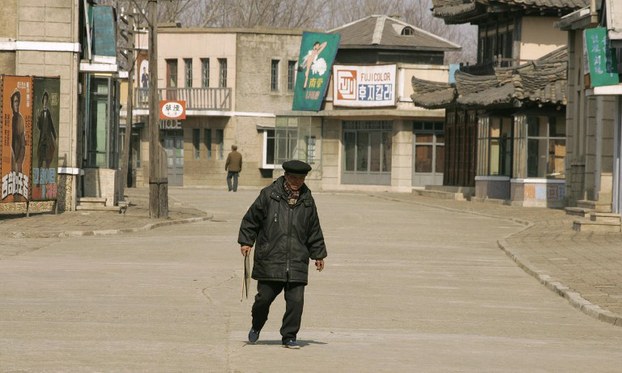North Koreans prohibited from watching foreign movies
| Publisher | Radio Free Asia |
| Publication Date | 14 May 2015 |
| Cite as | Radio Free Asia, North Koreans prohibited from watching foreign movies, 14 May 2015, available at: https://www.refworld.org/docid/555edb6a2b.html [accessed 1 June 2023] |
| Disclaimer | This is not a UNHCR publication. UNHCR is not responsible for, nor does it necessarily endorse, its content. Any views expressed are solely those of the author or publisher and do not necessarily reflect those of UNHCR, the United Nations or its Member States. |
2015-05-14
 A man walks through a deserted film set at the Korean Feature Film Studio just outside Pyongyang in a file photo. AFP
A man walks through a deserted film set at the Korean Feature Film Studio just outside Pyongyang in a file photo. AFP
North Korean authorities are prohibiting citizens from watching foreign movie videos, especially Chinese ones, reflecting worsening Sino-North Korean relations, sources from inside the country said.
Authorities decided to reinforce the banning of foreign videos, following the March arrests of two South Koreans – Kim Guk Gi and Choi Chun Gil – whom North Korea accused of espionage for allegedly collecting military secrets in the isolated country, sources said. South Korea denied the accusations at the time and demanded their immediate release.
"It's been more than a year since Chinese movies disappeared from North Korean television during foreign film time," a Pyongyang resident who recently visited to China told RFA's Korean Service.
"Also it is now impossible to watch Chinese movies via DVDs or USB drives," he said.
After the South Korean espionage case, the crackdown on illegal videos has been intensified, he added.
"If someone is caught watching Chinese videos that used to be allowed, he must be punished," the source said.
"People who are caught watching Chinese videos receive a less severe punishment than those who watch South Korean videos; nevertheless, it's hard for them to avoid punishment in a labor camp," the source added.
About six months ago, North Korean authorities did not take account of the Chinese residing in the country, who had DVDs and USB drives from which they could watch Chinese movies on the condition that they not share them with North Koreans, he said.
"But recently, authorities have forbidden people from bringing DVDs or USBs that store Chinese movies into North Korea," another source who lives in Pyongyang, but frequently travels to China told RFA.
He said that it was more than a year since Chinese movies had been shown on North Korean television.
"But DVDs with Chinese movies which were in circulation have recently disappeared without a trace," he said.
'Regime reacting hysterically'
North Korea's state-owned Mokran Video company distributes only DVDs of Russian movies on the battle between Russia and Germany during World War II, although many North Koreans prefer watching love stories and melodramas, which are difficult to find, he said.
"Kim Jong Un's regime is reacting hysterically to China, expressing its discomfort," a North Korean source in China said, referring to China's pressure on the country to abandon its nuclear weapons program.
When Kim Jung Un's father, Kim Jong Il, ruled North Korea, the country's relations with China were good and considered important. As a result, many Chinese movies and Mokran Video productions were shown on North Korean television and stored on CDs.
Last year, North Korea's state television station had stopped broadcasting Chinese and Russian films as part of a bid to protect the reclusive nation from foreign influences, sources inside the country told RFA.
The sources said that the official Chosun Central Television station had ended its regular weekend broadcast of films from China and Russia following a directive from regime leader Kim Jong Un, despite stable relations with the two nations.
Reported by Joon Ho Kim for RFA's Korean Service. Translated by Yunju Kim. Written in English by Roseanne Gerin.
Link to original story on RFA website
